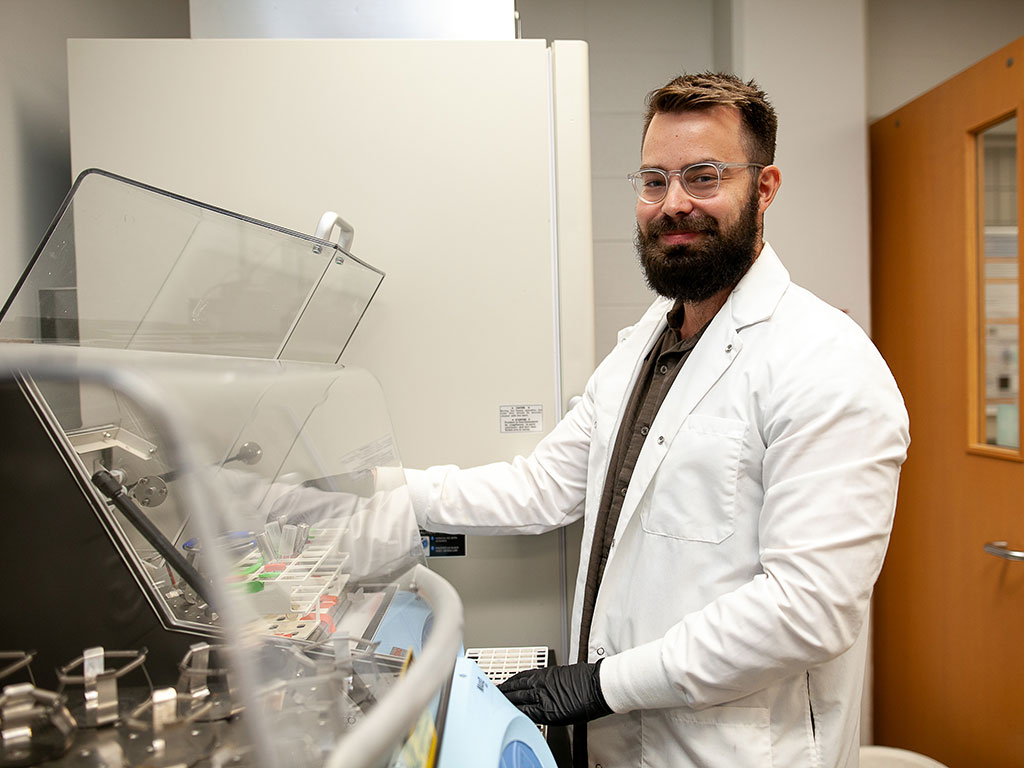
Exploring the unknown: Molecular plant pathology a passion for USask student
Plant pathology has been a fascinating topic of research for Matthew Wengler since the early years of his undergraduate program.
By Nykole KingWengler is now a graduate student in the Crop Development Centre in the College of Agriculture and Bioresources at the University of Saskatchewan (USask). For his master’s thesis he is researching lentil anthracnose, a major foliar disease threatening production in Canada.
What Wengler finds particularly interesting about this work is that it often begins with him venturing out without much of an idea as to what his findings will lead to. It becomes an exploratory process full of unknown factors. Although the journey may come with turbulence, he finds the work that much more rewarding and necessary.
“Going into the unknown and … trying to understand how plant pathogens infect their hosts (can directly) translate into producing superior cultivars with improved disease resistance,” says Wengler.
Wengler is from the Toronto suburbs with a Bachelor’s in Honours Biology from the University of Waterloo. He chose USask for his graduate studies based on the comprehensive crop research program that uses applied plant science and molecular biology to investigate the inner workings of plants.
Wengler’s supervisor is Dr. Sabine Banniza (PhD), a professor in the Crop Development Centre at Usask who leads the pulse crop pathology group.
“(Banniza) had a project that … aligned with my interests in plant pathology — but also in molecular biology — and I think it was just a perfect match.”
Lentin anthracnose is caused by the fungus Colletotrichum lentis (C. lentis). There are two major races of C. lentis, and good resistance to the more virulent and prevalent race has not yet been identified in lentil.
The fungus has recently developed an insensitivity to the fungicides that lentil producers rely on to manage the disease. Wengler’s research investigates the function of ToxB, a virulence protein secreted by the fungus that manipulates the crop’s immune response. Banniza’ s research group previously found that when the quantity of ToxB secreted by the fungus is lowered, it reduces disease severity.
“Resistance (to C. lentis) has been identified in a wild relative of lentil,” says Wengler. “The objective of the lentil resistance breeding program has now become (focused on) identifying resistance genes in the wild species which we can then use to (improve) our chances of moving resistance from the wild species into the cultivated lentil.”
While Wengler will soon be defending his master’s thesis, he is looking forward to beginning the next chapter of his research. In the fall he will start his PhD program at The Sainsbury Laboratory at the University of East Anglia in the United Kingdom.
“Virulence proteins have really driven the field of molecular plant microbe interactions over the past two decades,” says Wengler. “We want to try to understand how they work, how they contribute to a pathogen’s lifestyle, and what cellular processes or mechanisms they are targeting in the host … to shut down or hijack the plant immune system.”
To learn more about how to apply for graduate student opportunities with the Crop Development Centre, please visit the Plant Sciences graduate studies webpage
